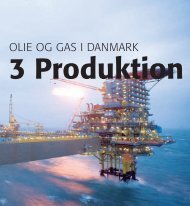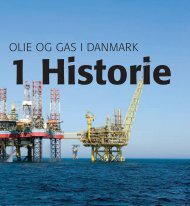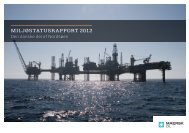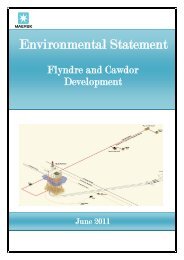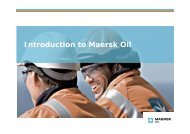Environmental Statement - Maersk Oil
Environmental Statement - Maersk Oil
Environmental Statement - Maersk Oil
You also want an ePaper? Increase the reach of your titles
YUMPU automatically turns print PDFs into web optimized ePapers that Google loves.
Major accidental<br />
events<br />
Other environmental<br />
aspects<br />
B ‐ 14<br />
<strong>Oil</strong> spills Loss of hydrocarbon<br />
containment.<br />
Produced water spills Accidental discharge of<br />
produced water above<br />
regulatory limits of 30mg/l.<br />
Failure of flow‐<br />
lines/loss of well<br />
control /fire<br />
explosion / loss of<br />
FPSO/ rupture in<br />
offloading line<br />
Consumption of<br />
materials<br />
Loss of platform, process plant<br />
or well control resulting in<br />
release of gas and condensate<br />
which may be ignited.<br />
Use of finite materials such as<br />
chemicals and steel. There will<br />
be a increase in chemical use<br />
with production, however<br />
there will be no changes to the<br />
surface infrastructure.<br />
Impact dependent on spill volume and weather conditions.<br />
Birds are most sensitive offshore receptor. Also affected are<br />
plankton, fish/fisheries, seabed animals & marine mammals.<br />
Affect also on amenity value, property (e.g. vessels in<br />
marinas) & commercial interests.<br />
Likelihood Consequence Risk<br />
2 2 Low<br />
<strong>Oil</strong> in water can result in narcotic, toxic, teratogenic impacts<br />
and enrichment etc.<br />
Likelihood Consequence Risk<br />
3 2 Low<br />
Atmospheric emissions contribute to global warming, acid<br />
deposition and ozone depletion. Damage to commercial<br />
fisheries. Sediment and water quality impairment. Potential<br />
discharge of hydrocarbons and various chemicals and gases<br />
into the environment. Fire‐fighting system comprises of CO2,<br />
water and foam (no halons released). Physical disturbance to<br />
other sea users.<br />
Likelihood Consequence Risk<br />
1 4 Moderate<br />
Balloch Field Development <strong>Environmental</strong> <strong>Statement</strong><br />
Procedures in OPEP are<br />
implemented should a spill occur.<br />
Training is provided on oil spill<br />
response to all appropriate<br />
personnel. <strong>Maersk</strong> are members<br />
of OSRL (OSRL are on standby to<br />
provide oil spill clean‐up when<br />
required.<br />
Procedures in the OPEP are<br />
implemented should a spill occur.<br />
Inspection &engineering<br />
maintenance strategy based on<br />
preventative maintenance.<br />
Dispersant on board standby<br />
vessel available for local<br />
response. <strong>Maersk</strong> has<br />
membership of OSRL. Emergency<br />
Response Plan implemented in<br />
the result of a loss of well<br />
control/fire and explosion and<br />
activation of fire‐fighting systems.<br />
Regular drills held.<br />
Snap locks on transfer lines<br />
Use of non‐renewable resources. <strong>Maersk</strong> has an expectation to<br />
recognise the limitations of<br />
Likelihood Consequence Risk<br />
resource availability. Company<br />
Policy to minimise waste. This<br />
1 2 Low<br />
includes reducing the quantity of<br />
materials used.<br />
Appendix B ‐ <strong>Environmental</strong> Assessment<br />
Low impact.<br />
Negligible impact.<br />
Spills may cause local<br />
elevation of hydrocarbon<br />
levels and contamination<br />
and toxic effects and<br />
socio‐economic impacts<br />
to fishing, and tourism.<br />
Mitigation measures will<br />
ensure actual risk of a<br />
spill are within tolerable<br />
levels.<br />
Materials used on the<br />
platform indirectly<br />
impact natural resources.<br />
Low impact.




